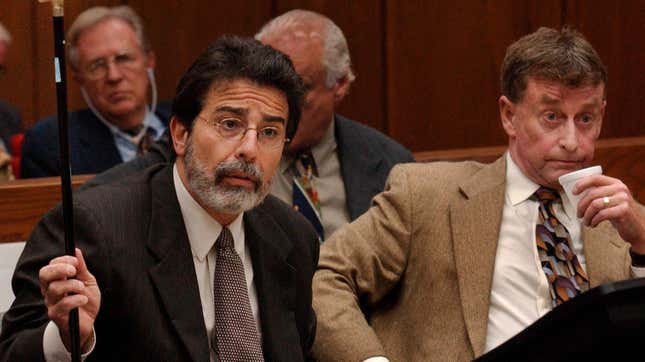David Rudolf Isn’t Happy About HBO’s ‘The Staircase’
The famed attorney (and noted heartthrob) talks candidly about what the new HBO drama series gets wrong and how it feels to be a sex symbol.
In Depth

David Rudolf and I have already been chatting for approximately 42 minutes when I finally gather the nerve to ask: “Did you think you were sexy while filming The Staircase?”
The criminal defense and civil rights attorney, made famous by the 2004 docuseries on the high-profile case against his client, Michael Peterson, is played by Michael Stuhlbarg in the new HBO Max miniseries based on the same case. And, for a millisecond, I fear the question was inappropriate. But before a bead of sweat can form on the back of my neck, Rudolf exclaims, “Of course!” with a wrinkled brow, as if his raw sex appeal is an undisputed fact. “Are you kidding?”
One may wonder why I would be asking a preeminent defense attorney about his desirability; in this particular instance though, it’s certainly relevant information. Last weekend, I wrote a not entirely shameless blog about my crush on Rudolf, in which I misused legal jargon like Elle Woods in the hopes that perhaps he’d see it and agree to an interview. While that piece will hardly earn me a Pulitzer, apparently I won my case.
Eight hours after it published, Rudolf reached out to me via Twitter DM: “Yes, I read your article. How could I not? Catchy title. How about interviewing me about this?” Attached was a link to a recent Vanity Fair story, where the filmmakers of the docuseries made plain their vexation with the growing list of creative liberties taken by HBO Max. Interestingly, Colin Firth eating Toni Collette’s ass wasn’t one of them. And because it’s rare that one gets to speak with the subject of their public thirst, we meet via Google Meet two days later.
It’s not until I’m screen to screen with Rudolf that I realize I’m interviewing the man who knows I wrote the words: “Justice may be blind, but I’m not. WYD later, David?” Fortunately, he has a sense of humor. “It’s all fun,” he chuckles in reference to my public declaration. “I appreciate it.”
In the hour-and-20-minute conversation, we vacillate between the more maddening amendments made by the HBO series (including that anilingus scene), the inherent flaws in the foundation of the American criminal justice system (too many to list here), and yes, even some lighter fare, like what music he listens to (“I think Eminem is a genius.”). When my initial embarrassment dissipates, we start with the Vanity Fair piece.
Since its premiere on May 5, HBO Max’s take on the original Peabody Award-winning docuseries—which hit Netflix in 2018—has likely befuddled anyone who’s actually seen both. While the Antonio Campos-adapted drama still follows the trial of Peterson, a novelist accused of murdering his wife, Kathleen, the team behind the original series now claims HBO Max is, as Vanity Fair put it, “recklessly blurring the lines of fact and fiction”—particularly in recent episodes. Those at the helm of the docuseries—namely documentarian, Jean-Xavier de Lestrade, producer Allyson Luchak, and editor Scott Stevenson—say they feel betrayed by the dramatized depiction of the story and have even asked HBO Max to add a disclaimer before each episode, stipulating that the series is only “inspired” by real-life events.
“We gave [Campos] all the access he wanted, and I really trusted the man,” de Lestrade told Vanity Fair.
Rudolf, too, tells me he’s disappointed with several aspects of the show and even agreed to recap each episode for The Charlotte Observer to parse out fact from fiction. “I’m mostly annoyed, to be honest. I’m not angry. I’m not terribly surprised, although I had better expectations for Antonio,” says Rudolf. “I’ve spoken to him a number of times, and I made it really clear to him that the only thing I cared about was that he get it accurate. Whether he painted Michael innocent or guilty—people can make up their own minds about that.”
-

-

-

-

-

-

-

-

-

-

-

-

-

-

-

-

-

-

-

-

-

-

-

-

-

-

-

-

-

-

-

-

-

-

-

-

-

-

-

-








































